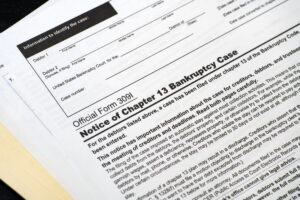One of the things we’ll want to know when we prepare your bankruptcy petition is what secured debts you have. Secured debts involve loans where you have promised the lender they can take certain property if you stop making payments on the loan. Car loans and mortgages are typical secured debts, but department stores like Best Buy, Lowe’s, Home Depot, and others include provisions in their credit cards that give them a security interest in certain things you buy at their stores with their cards.
If you have any secured debts, you have to decide how you want to handle that debt and the collateral when you file bankruptcy. Besides surrendering the property or reaffirming the debt, you can also redeem the property. When you redeem property you are essentially buying it, but you can usually get the creditor to agree to let you buy it for what the property is worth, not what you owe under the terms of your loan. For example, if you owe $10,000 for your car, but it’s only worth $8,000, you could get the creditor to agree to release its lien for $8,000.
Of course that presents the question of where the $8,000 comes from. Typically creditors when not allow you to make installment payments when you redeem property. That means that you’ll have to come up with a lump sum. There are lenders out there who provide redemption loans and deal everyday with people who are going through bankruptcy. You could also ask a family member or friend to lend you that money.
Redeeming property is your right under Section 77 of the Bankruptcy Code as long as the property is exempt or the trustee has abandoned the property. While we should be able to negotiate redemption terms with the creditor, sometimes court intervention is needed. If you can’t redeem the property, we can also discuss your options if you reaffirm the debt.
You should think twice about redeeming any property like personal electronics or appliances unless the lender is willing to take a minimal amount. This type of property depreciates rapidly and steeply, so the better option might be just to call their bluff and tell them that you are going to surrender it. There’s a good chance they won’t go to the trouble of coming to get it. You’re under no obligation to take it to them.
If you have questions about redeeming your property in bankruptcy or anything else about how bankruptcy will affect you, we hope you’ll come in for a free, no-obligation consultation with an experienced lawyer. You can an appointment using our online scheduling system or by calling 303.331.3403 to set up a time that is convenient for you.


